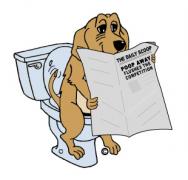The Scoop on Poop: Diarrhea in the Family Pet

The Scoop on Poop: Diarrhea in the Family Pet
I can’t imagine there is any pet family that has not experienced an episode of diarrhea in their pet. A bout of diarrhea is common, especially when dogs help themselves to a snack from the kitchen trash can or when the weekend guests stress out the family cat. These issues usually resolve themselves in short order, but sometimes diarrhea requires treatment.
Age Matters
The common causes of diarrhea vary depending on the pet’s age. Intestinal parasites occur at any age, but are most common in puppies because roundworm-infected mother dogs pass roundworms to puppies before they are born. Inquisitive young dogs patrol the trash; eat anything they can on the street, and because of this behavior, frequently have diarrhea. Failure of the pancreas to produce digestive enzymes is another cause of diarrhea in a young dog. Older dogs may have diarrhea from inflammatory bowel disease or something more sinister like kidney disease or cancer. Dietary intolerance or intestinal bacterial infections like Salmonella or Campylobacter can occur at any age.
Testing Poop and More!
A good place to start when your pet has diarrhea is a fecal analysis. Routine fecal testing can identify a host of intestinal parasites, including roundworms, hookworms, whipworms, coccidia and Giardia. Your veterinarian will love you if you bring the morning “sample” to your pet’s appointment. In a young puppy or kitten with diarrhea, this might be all that is needed to diagnose and resolve the problem. In an adult dog or cat, blood tests may be indicated to determine if the diarrhea is the result of a systemic illness like kidney disease, poor digestion or inadequate absorption of food. I find x-rays helpful in vomiting pets, but less so in cases with diarrhea. Ultrasound, which allows us to look at the structure of all the abdominal organs, as well as the thickness of the intestine, is more useful in diarrhea. In challenging cases of diarrhea, an intestinal biopsy may be necessary to sort out the situation.
Broad Range of Treatments
De-wormers take many forms. Some come as injections, others pills and yet others as powders to be mixed in the food. They are very safe and effective, but with roundworm infestations, the gross factor can be high when your puppy poops out a mass of three inch long spaghetti-like worms. Another common treatment for diarrhea is a diet change. One strategy is to feed a bland, highly digestible diet to rest the intestinal tract. The other is to feed novel protein and carbohydrate sources, ones your pet has not previously eaten in case a dietary intolerance has developed. The hunt for novel protein and carbohydrate sources has resulted in creative diets like duck and pea, salmon and sweet potato and even kangaroo and oats. Depending on the cause of your pet’s diarrhea, he may receive vitamin supplementation, digestive enzyme supplementation, antibiotics or steroids.
Time for a Trip to the Vet
If your pet has diarrhea, a veterinary visit is indicated if:
- Your pet is very lethargic, not eating or is also vomiting.
- Diarrhea is bloody.
- Diarrhea occurs with a fever.
- Diarrhea persists for more than a few days, even if there are no other clinical signs of illness.

































